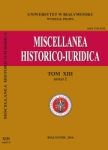Extramarital Relations among Jews in the Ottoman Empire
Extramarital Relations among Jews in the Ottoman Empire
Author(s): Leah Bornstein-MakovetskySubject(s): Law, Constitution, Jurisprudence, Jewish studies, History of Law, Modern Age, 16th Century, 17th Century, 18th Century, 19th Century
Published by: Wydawnictwo Uniwersytetu w Białymstoku
Keywords: extramarital relations; Jews; Ottoman Empire;
Summary/Abstract: The present paper deals with the ways in which Jewish communities in the Ottoman Empire handled cases of extramarital relations (fornication) among Jewish men (married or unmarried) and unmarried women. The present study covers a wide range of Jewish legal sources from the beginning of the 16th century to the last decade of the 19th century. As we have seen, the occurrence of sexual relations out of wedlock for married men, or unmarried men and unmarried women, was an extant feature of Jewish society; it was almost certainly much more widespread than adultery. Particularly common were relations between the betrothed, usually leading to marriage. Similarly, cases were common of unmarried women, often maidservants in Jewish homes, who had sexual liaisons with different men. Most of the surviving sources deal with women’s pregnancy and their demands that the men marry them, or at least acknowledge their paternity and pay child support for the babies. Jewish society stood guard over its sexual morality, deliberating about cases of extramarital pregnancy within the confines of the local legal court. The communities’ supervision of sexual morality led to the enactment of new decrees in some places and in rare cases, the offenders involved would be punished by lashes. We learn that Jewish society attempted to conceal sexual offenses from the eyes of the Muslim rulers.
Journal: Miscellanea Historico-Iuridica
- Issue Year: 13/2014
- Issue No: 2(2)
- Page Range: 25-45
- Page Count: 21
- Language: English

